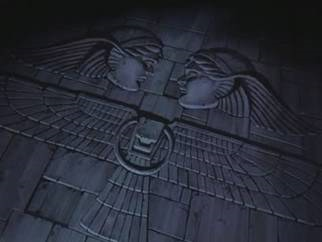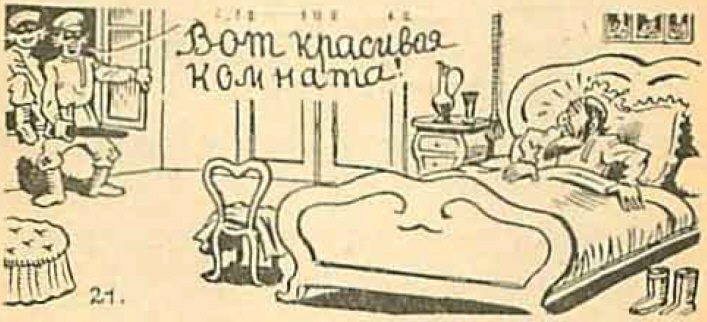Languages
Russian for English speakers 1951



|
Languages
|
 |
  |
| Russian for English speakers 21 |
 |
| Lesson 21 |
|
Russian |
English Английский |
|
|
58 - пятьдесят восемь |
fifty eight |
|
|
59 - пятьдесят девять |
fifty nine |
|
|
60 - шестьдесят |
sixty |
|
|
61 - шестьдесят один |
sixty one |
|
|
Двадцать первый (21-й) урок |
Twenty first lesson |
|
|
УРОК НОМЕР ДВАДЦАТЬ ОДИН (№21) |
Lesson number twenty one (#21) |
|
| REVISION AND NOTES | ||
| 1 |
There are three genders in Russian : masculine, feminine
and neuter. |
|
|
1.1 |
Masculine. — When a noun ends by a consonant, it is
masculine. Thus : |
|
|
город |
town, city |
|
|
стол |
table | |
| урок | lesson | |
| самовар | samovar | |
| билет | ticket | |
| театр | theatre | |
| барабан | drum | |
| раз |
(one) time, an occurrence |
|
| диплом | diploma | |
| язык |
language, tongue |
|
|
|
друг |
friend |
|
ресторан |
restaurant | |
| хлеб | bread | |
| сыр | cheese | |
| снег | snow | |
| мороз |
frost (extreme coldness) |
|
|
подарок |
gift (a present) |
|
| are masculine | ||
|
But there are also masculine nouns in й and ь. |
||
| Thus : | ||
|
портной |
tailor | |
| лентяй |
a do-nothing, an idler, "a lazy one" |
|
|
день |
day | |
| госпиталь | hospital | |
| 1.2 |
Feminine : the ending а or
я (save for a few exceptions) denotes
the feminine. |
|
|
работа |
work | |
| деревня |
country (countryside) or village |
|
|
комната |
a room; bedroom = спальня, спальная комната |
|
|
игрушка |
toy | |
| труппа |
theater troop; company = компания |
|
|
зима |
winter | |
| голова | head | |
| газета | newspaper | |
| лестница | staircase | |
|
When a noun in а
is not feminine, it is because its meaning makes it impossible. |
||
|
папа |
daddy |
|
| is naturally masculine. | ||
|
There are also feminines in ь, like |
||
|
мать (мама) |
mother |
|
| 1.3 |
Neuter. — The neuter is characterized by the final
о,
е, and
sometimes мя. |
|
|
слово |
word | |
| письмо |
letter (to some one); a letter of an alphabet is буква |
|
|
место |
place | |
| пальто | overcoat | |
| вино | wine | |
| упражнение | exercise | |
| произношение | pronunciation | |
| время |
time (on clock) |
|
| 1.4 |
In short : |
|
| 2 | The adjective agrees with the noun : | |
|
Вот красивый самовар |
here is a beautiful samovar. | |
| Вот красивая комната |
here is a beautiful room |
|
| Вот красивое слово | here is a beautiful word. | |
| There is also a short form of the adjective : | ||
|
Этот самовар красив |
this samovar is beautiful. |
|
| Эта комната красива |
this room |
|
| Это слово красиво | this word is beautiful. | |
| However the short form is used less and less in the current language. | ||
|
AK-NOTE : See lesson 20, note 6, AK-NOTE about adjectives as adverbs. |
||
| 3 |
Declensions : we have only had a glimpse of the
declension of nouns. |
|
|
Ваш ребёнок |
your (pl.) child (nominative) |
|
|
Вашему ребёнку |
to or for your child (dative) (the о of the last syllable is left out). |
|
| We should have in the same way : | ||
|
Ваш муж |
your (pl.) husband. |
|
|
Вашему мужу |
to or for your husband. | |
| Мой обед | my dinner. | |
| Моему обеду | to or for my dinner. | |
| Наш друг | our friend. | |
| Нашему другу | to or for our friend. | |
| In the feminine, it was the genitive we came across : | ||
|
Жажда |
thirst. | |
| Без жажды | without thirst. | |
|
Без |
without | |
|
, is always followed by the genitive, as if one said : without of thirst. |
||
| Also in the plural : | ||
|
Игрушка |
toy. | |
| Игрушки | toys. |
|
Tweested English Section
REFERENCES. — If a word or a turn of
speech keeps escaping your memory, These are nothing but bits of declensions, which simply serve to show
us the principles. |